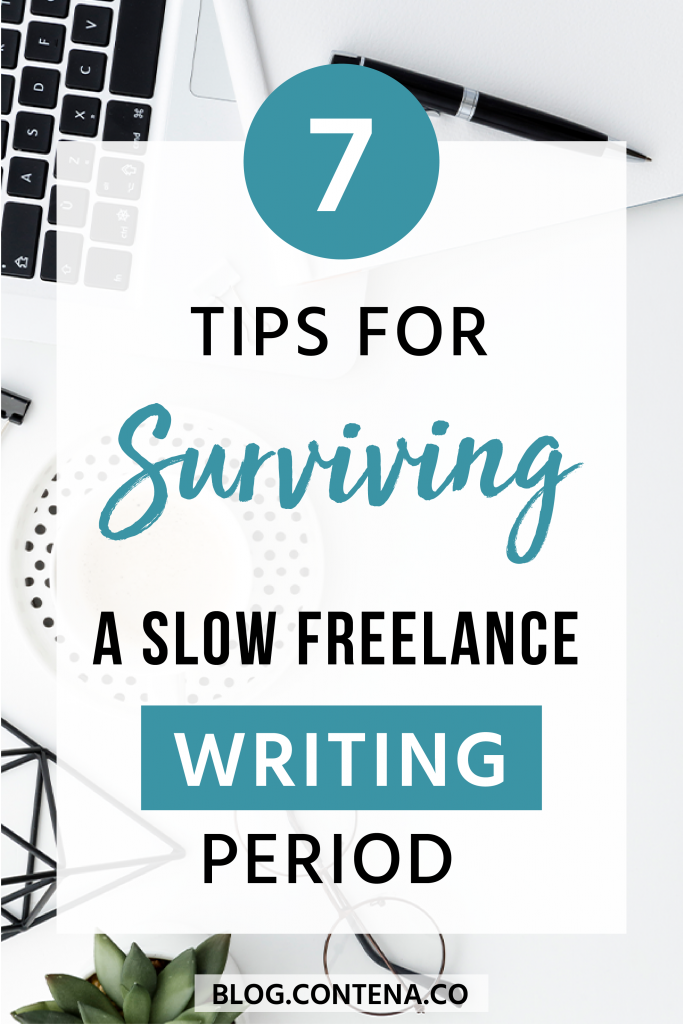Freelancing is like a roller coaster ride. It certainly has its ups and downs.
Running your own business can be super rewarding and comes with plenty of perks. However, one aspect that can take newer freelancers by surprise is the feast-or-famine nature of the business.
I’m talking about dealing with slow periods, lulls in work. It happens to the best of us and for many different reasons. Maybe a long term project finished, a client budget dried up, or you just haven’t landed a new gig in a while.
Let me reiterate. It happens.
Planning for slow times is always going to be the best line of defense. Building a nest egg is probably the single most important thing you can do to safeguard yourself financially. I honestly could go on and on about this, but seriously, just start saving.
But we’re not here to talk about “should have, could have.” Regardless of what steps you have (or have not) taken to prepare for a slowdown, there are things you can do here and now to make slow periods more manageable.
Before you go running to the content mills, let’s dive in and discuss 7 helpful tips on how to successfully survive a slow period.
Pitch More
When your workload gets light, it’s time to increase your pitching. Ideally, you’ve been doing this all along, but if not, now’s the time to start in earnest.
Pitching for jobs should be the very first thing on your to-do list each day. Sure, many freelancers land clients by word-of-mouth and referrals, but pitching is truly our bread-and-butter.
Set a daily goal for an ideal number of pitches to send out and strive to meet (or exceed) it every day. Depending on how and when you work, try to make it your top priority, whether that be with your morning coffee, on your lunch break, or your first task after dinner.
Luckily for you, Contena has found a way to make this somewhat tedious task, an effortless one for any freelancer. Use the search tool to narrow results by category, job type, and even application format. With this streamlined process, you can quickly find hundreds of gigs to choose from that can help speed up a slow period in no time.
Just as important, don’t forget to cold pitch as well.
Once you’ve gotten your digital pitches out of the way, get a little creative close to home.
While the common saying may be “shop local,” I would encourage you to “pitch local.”
Think about businesses you frequent in your daily life. Could your services be of any help to them? If so, consider writing up a small intro or pamphlet explaining how your writing services can help “next-level” their business.
Look To The Past
While you’re waiting to see if any of your pitches land, don’t forget to reach out to past clients. If you’re lucky, a quick email can be a memory jog for a project a client had put off or even forgotten about.
Even in the worst case scenario where the client doesn’t need a writer at the time, you keep yourself fresh in their mind. If they do come across a need, you may just be the first person they think of!
Additionally, you can respond with a referral ask.
Client: I’m all set now, thanks! I’ll keep your info on file for potential projects!
Freelancer: Thanks for keeping me in mind! If you know of anyone in your (circle/group/industry) that requires a writer, please feel free to pass along my contact information!
You likely will have at least one client lurking in your portfolio, regardless of how small. It may have been you helped them with a one-off piece, a review, or a short term project. Leave no stone unturned (Unless it was a bad experience. In that case, evaluate if it’s worth your time.)
Increase Offerings
If you’re waiting on hearing back on new pitches and old clients, you can also opt for broadening your horizons.
By increasing your offerings, you open yourself up to a whole new set of clients and projects. Not every client needs blog posts and articles. If you pigeonhole yourself into just that one need, you’re passing up significant business-expanding opportunities.
Feeling stuck? Here are just a *few* of the ways you can expand your offerings using your freelance writing smarts.
- Website Content
- Corporate Copy
- Advertising Copy
- Press Releases
- In-house Publications
- Social Media Content Creation
- Editing
- Podcast Scripts
- Newsletter Campaigns
- Product Descriptions
- Grant Writing
- Content Strategy
- Ghost Writing
- E-Books
- Resumes
- Bio Writing
- FAQs
The list goes on and on. Hopefully, one of the writing jobs above strikes a chord with you or can help inspire you to beef up your service offerings in other ways!
Temporarily Tighten Your Budget
When works slows down, your top concerns may be about your finances. After all, a freelancers’ gotta eat (and pay bills, and rent, etc.) While there are ways to shore up some quick cash, taking a budget-tightening step can help stave off some of that worry, here and now.
Start by going through all your accounts for incoming and outgoing money. This means taking a deep dive into your bank statements and as tedious as that can be, it’s 100% necessary.
Especially look for any recurring charges or subscriptions you can do without. Do you really need two streaming services and a cable subscription?
The answer?
Probably not.
For membership services you’re truly invested in, can’t do without, or will incur a hefty fee to drop, ask about putting a temporary hold or freeze on your account.
Cut the fat
During your deep-dive into your accounting, also take note of areas where you may be able to cut back. Things like dining out, Starbucks runs, and lunch-on-the go can undoubtedly add up. I’m a big proponent of making your food and coffee at home.
It may take a bit more time (not much!) to plan ahead, but it can definitely help cut down on extraneous spending. I’m not saying you have to say goodbye to your beloved caramel macchiatos forever, but until work picks back up, it may be best to take a break from specialty handcrafted beverages.
You may also benefit from being more mindful about household utilities such as water and electricity. Plus, you score bonus points for being eco-friendly! Even small changes can make a difference.
Passive Income
While this tip won’t particularly help in an immediate sense if it’s not already in place, passive income can be a fantastic guard against the perils of slow periods.
Passive income is money you make with little to no effort on your part, past the initial “buy-in.” Essentially, once the product or program is set up, there’s little else you need to do besides earn!
You can generate passive income in a few different ways. Two popular avenues to explore are products and affiliate programs.
Products
Products can run the gamut from printables and ebooks to online courses and, for those more technically inclined, plugins and themes.
There are so many types of products you can offer, so be sure to find one that best fits both your experience and audience best. Consider the products you consume not only as a freelancer but in your day-to-day life. What expertise can you offer?
Affiliate Programs
Think of affiliate programs as a referral reward. Typically, these programs give you a portion of the sales when customers use your referral links or codes to purchase products or services.
Affiliate programs are especially great for those who run a blog or website that publishes content regularly. Typically, you’ll need to apply to the program and if accepted, adhere to a set of rules set by the company.
Some programs will stipulate you need to make a certain number of sales during a period of time while others will keep you on board as a referral service regardless of clicks or sales. Learning the terms of service for different programs can be overwhelming but well worth the time if done correctly.

Grow
Going through a slow period can also mean a lot more downtime than you may be used to. Aside from filling up your hours following our advice above (pitch, pitch, and then pitch some more!), using your free time to better your craft and your business can help stave off further slow times in the future.
Personally, I seem to forever have an unfinished course sitting in my browser. I’ll admit, when I’m flush up with client work, the class often falls to the wayside. When things slow down, I use the time as an opportunity for professional development.
By learning a new skill (or brushing up on a new one), you increase your value as a freelancer. Almost every freelancer, no matter how good, will go through a slow period at some point or another. Instead of wallowing in self-doubt, use the time to invest in yourself.
Not sure where to start? As part of your Contena Academy membership, you’ll get nine unique training modules that can help you land better clients, negotiate like a pro, upsell your services, and more. The best part? The training is only one part of your Contena Academy membership- we also have our writing job finder, writing alerts, writing submissions, and writing leads (Learn more here).
Become a Side Hustle Extraordinaire
The beauty of freelancing is the flexibility it offers. If you’re freelancing while holding down a 9-5 experiencing a slow period, doubling down on pitching efforts may be the most direct approach.
Those who depend on freelancing as their primary source of income may have a bit more versatility when it comes to options for supplementing their paychecks.
Enter the side hustle.
After you’ve sent your pitches, cut down on monthly expenditures, and have looked into ways to expand your services, you may want to consider picking up another gig, even if only to hold you over.
Many freelancers opt for a part-time job to help complement their earnings. Whether it be a seasonal retail position, something based in your niche, or even driving for ride share services, there’s no shame in hustling to make your monthly numbers.
We luckily live in the booming gig economy, which affords more opportunities than ever before. When the going gets tough, hustle harder!
Parting Thoughts
If there’s one recurring theme within these tips, it’s that you have to be proactive. While it does happen, albeit far and few between, most jobs just don’t come to you.
Aside from being proactive, don’t let a lull turn into a rut. It can be all too easy to let a slow period get you down in the dumps.
As I said in the beginning, freelancing is like a roller coaster. With the “downs,” also comes the “ups.” Remember why you got into freelance writing in the first place. Remember your wins. Use these as talismans to get you through any negative thinking.
If this isn’t your first slow period (and it may not be your last), try to spot a pattern. Many freelancers slow down on pitching and marketing themselves when they’re flush with jobs. Don’t fall into that trap.
If you’re unhappy with the speed that your business if growing, remedy the causes. After all, the motto of freelancing might as well be “You get what you put in.”










